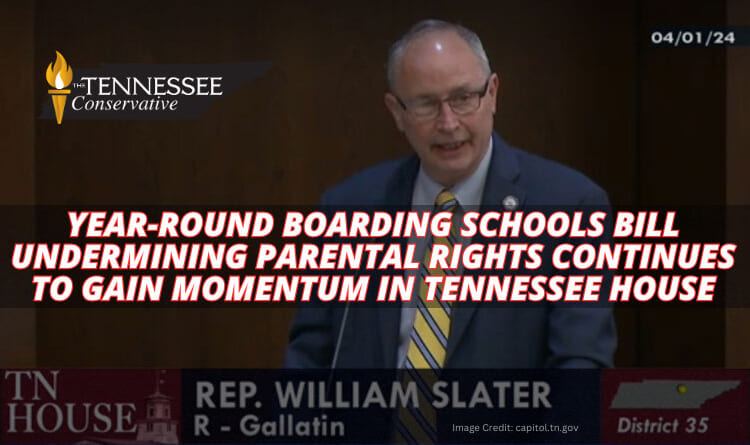Image: HB2922’s co-sponsor Rep. William Slater presents the legislation to the House Government Operations Committee. Image Credit: capitol.tn.gov
The Tennessee Conservative [By Paula Gomes] –
A bill that would create year-round boarding schools serving “at risk” youth in Tennessee continues to gain momentum despite concerns over the lack of involvement in such schools by parents.
House Bill 2922 (HB2922) sponsored by Speaker Cameron Sexton (R-Crossville-District 25) along with co-sponsor Representative William Slater (R-Gallatin-District 35) picked up another sponsor from across the political aisle yesterday in Representative Sam McKenzie (D-Knoxville-District 15).
The proposed legislation that would create a new type of public charter school with a residential component is similar to a bill that Sexton sponsored last year and which received pushback from Tennesseans. This year’s bill began its journey through the General Assembly as a sneaky caption bill.
Despite hearing serious concerns regarding parental rights, a voice vote passed the bill out of the majority Republican House Government Operations Committee and onto Finance, Ways, and Means.
Of the twenty-one committee members, five requested to have their vote recorded as a No – Democrats John Ray Clemmons, Yusuf Hakeem, Caleb Hemmer, Gloria Johnson, and Justin Jones – and one Republican, Representative John Crawford (R-Bristol/Kingsport-District 1) asked to be recorded as Present, Not Voting.
As amended, the bill does not require a parent to be on the board of an “opportunity school” as is typical with other charter schools in the state but participation is based on parental choice, a point that Slater emphasized.
Jasmine Miller, Staff Attorney at Youth Law Center, said that the proposed law undermines “the number one most important intervention for Tennessee’s young people: Quality parenting” and would also stymie the responsibility that the state has “to ensure that youth in foster care are placed in families, not in long term institutional settings.”
Citing last year’s version of the bill when sponsors suggested that it would provide placement options for children in state custody, Miller stated, “The state cannot and should not be in the business of replacing families with schools and it will not solve the core issues affecting placement difficulties for youth in DCS custody.”
Miller also said that the year-round schools would not have the ability to offer “high quality community based mental health services” that the varied student population would need.
“The state has not appropriated the funding that would be necessary to ensure basic provisions of services in a residential school setting,” said Miller. “Residential charter boarding schools are few and far between in the United States, but those that do exist report per pupil spending of 60,000 to $80,000 per student.”
Zoe Jamail with Disability Rights Tennessee expressed concern that youth with disabilities would end up at the residential schools. These young people, autistic youth in particular, Jamail, said “need families and services, not placement in residential facilities, and those families, be they biological parents, kinship or relative caregivers or foster families need supports in the community that enable them to keep their children in their homes.”
In comparing “opportunity schools” with other state-run residential schools – the Tennessee School for the Deaf and School for the Blind – Jamail said that the congregate setting being proposed “differs substantially” as students at those schools maintain their connections to family and their communities by going home on the weekends and during school breaks.
“No such maintenance of family contact or even parent participation on the board is contemplated in the bill,” said Jamail.
In response to a question, Jamail also said that youth in congregate settings are at a higher risk of abuse with up to 85% of cases going unreported. Jamail stated, “One of the things that prevents that is contact with family and being able to tell family when abuse or neglect is happening in a facility like that.”
About the Author: Paula Gomes is a Tennessee resident and reporter for The Tennessee Conservative. You can reach Paula at paula@tennesseeconservativenews.com.












